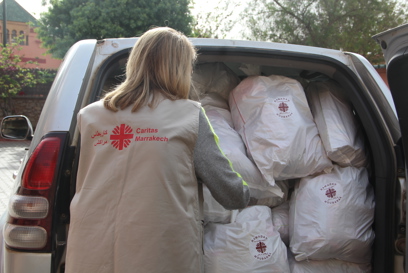November 30 marked the start of COP28, also known as the Conference of the Parties, where United Nations (UN) member states meet to discuss and plan climate action. Caritas Australia is on the ground at the annual conference, with a new report Unheard, Uncharted: A holistic vision for addressing 'non-economic' loss and damage.
COP’s main objective is to limit global warming to within 1.5 degrees of pre-industrial temperatures, in line with the Paris Agreement. Increasingly though, the conference has a dual focus with financing emerging economies to deal with the impacts of climate change now a second but equally important stream.
Developed countries have produced 92 per cent of all historic emissions, but the impacts of climate change are most heavily felt by developing nations such as our neighbouring Pacific Island communities. Notably, Tuvalu is an Island nation set to disappear underwater as sea levels in the western Pacific Ocean are rising at a rate 2–3 times the global average. Meanwhile South Sudan is one of the world’s most rapidly warming countries with periods of drought and flooding leading to widespread food insecurity.
These developing countries face huge challenges around climate adaption and resilience, as well as potential migration, all of which carry vast economic costs. A UN commissioned report predicts that climate-related loss and damage will total $150-300bn a year by 2030.
At COP27 in 2022 world leaders came to a breakthrough agreement to provide loss and damage funding for vulnerable countries hit hard by climate disasters, which currently only covers economic loss. Developing countries and their partners, such as Caritas Australia, have welcomed the announcement on the first day of COP28 that a model has now been agreed to, with international governments having made initial commitments of $400 million.
What our Pacific partners are telling us though is that the fund must also cover ‘non-economic’ loss and damage: the massive impacts to people’s lives, homes and health wrought by climate change, and the cultural and spiritual loss that accompanies it.
Developed alongside Caritas Internationalis, Catholic Relief Services and The Scottish Catholic International Aid Fund, the ‘Unheard, Unchartered’ report calls for the ‘non-economic’ impacts of climate change to be acknowledged, measured, and funded as part of the Global Stocktake process and the enacting of the Loss and Damage Fund.
To support this report, we also asked Australians how much they understand and think about the ‘non-economic’ impacts of climate change at home and abroad. 9 in 10 Australians said they care about ‘non-economic’ loss and damage caused by climate change, with respondents also stating they think about this more than economic loss.
We also found Australians are thinking about the displacement of people due to climate change, with 3 in 4 considering it to be an important issue. Around 2 in 3 respondents were aware the Pacific is under threat of climate displacement in areas by 2050, with 2 in 5 saying the same of Australia.
Crucially, many of us want to see politicians do more about ‘non-economic’ loss and to see it more widely covered in the media. We hope COP28 brings that to bear, with media and politicians alike focussing on the full breadth of loss and damage - and with governments across the world making concrete financial commitments to funding solutions.
Photo L-R:
Damian Spruce, Associate Director Advocacy, Caritas Australia; Milise ‘Ofa’ Foiakau, Uniting Church, PULSE Field Officer; Brianna Fruean, Pacific Climate Warrior and Youth Climate Justice Activist; The Hon Chris Bowen MP, Minister for Climate Change and Energy; Winton Herman, Cook Islands Climate Activist, Caritas Oceania Youth Alliance; Olivia Baro, Ecumenical Youth Enabler at Pacific Conference of Churches; Rev James Bhagwan, Secretary General, Pacific Conference of Churches

















